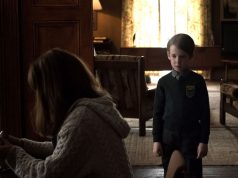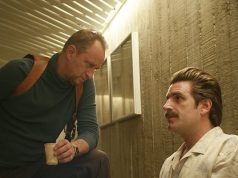“Twilight Samurai” is to Japanese samurai flicks what Clint Eastwood’s “Unforgiven” was to American Westerns. It belongs to its violent genre even as it espouses a philosophy of anti-violence, and it spotlights characters who are far more thoughtful and humane than one normally finds in films of its type.
It is the 19th century, at a time when the samurai system is beginning to wane as Japan is beginning to modernize. Our hero is Seibei Iguchi (Hiroyuki Sanada), a quiet, disheveled men in his 30s whose wife has died after a long battle with consumption, leaving him to care for two young daughters and his own aging, senile mother. He trained at the dojo of an acclaimed master many years ago, but has since become entirely domesticated, intellectual and peace-loving. He encourages his daughters to read and think, unheard of for females in those days.
By chance he is reunited with Tomoe Iinuma (Rie Miyazawa), the girl he teased and payed with as a child who has now just been granted a divorce from her alcoholic, abusive husband Koda (Ren Osugi). Tomoe is sweet, maternal and smart, and her influence on Seibei’s house — both with housekeeping and in being a surrogate mother to Seibei’s daughters — is immediate. When Seibei must defend her against Koda one night, it would seem their fate is sealed. Surely Seibei and Tomoe are in love and will get married.
But Seibei is hesitant. This is, in fact, not an action movie but an inaction movie, a film about a man who cannot decide. Leaving behind his old samurai ways had the positive effect of making Seibei rational and calm, but it also took the occasionally necessary killer instinct out of him. He can no longer make important decisions quickly, as would a warrior in the midst of battle. He is mired in self-doubt and introspection, a sort of Japanese Hamlet.
Then the governing body of samurais known as the Clan (not the Klan, thank goodness) calls upon Seibei to dislodge and kill a rebel who has barricaded himself within his house. The rebel is skilled at short-sword combat, which was Seibei’s expertise, too, back in the day. Seibei is told if he does not accept the assignment and kill the rebel, he will be put to death himself. The decision having been made for him, he sets out to perform the task.
Director Yoji Yamada, adapting the novels of Shuuhei Fujisawa, shoots the few duel scenes in this film with remarkable restraint. There are no quick cuts; there are hardly any cuts at all, in fact, the camera instead remaining neutral at a medium distance from the action. This has the double effect of showing us how skilled the actors are, as there clearly are no special effects being used, and also of making the action seem less adrenaline-fueled as in most films. The fights simply happen, without fanfare or melodrama. They are not romanticized or made to seem more thrilling than they are.
I am also quite taken with Hiroyuki Sanada’s extremely sympathetic performance as Seibei. He’s an honest, honorable man who loves his family but who has been thrown so many curveballs that he hardly knows what to do anymore. We feel for him immediately, hoping things will work out for him, and I marvel at how a character so far removed from modern Western culture can seem so much like you and me.
B+ (2 hrs., 9 min.; Japanese with subtitles; )





